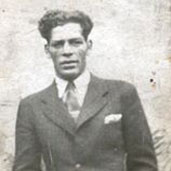
Johann Trollmann was born on 27th of December 1907. He was born in Wilsche, Gifhorn near Hannover, Germany as the son of a Sinto family. “Ruk” means tree in the Romanes language and because his athletic and aesthetic body reminded the family of a beautiful, well-grown tree, everybody called him “Rukeli”.
Rukeli Trollmann grew up with eight siblings in the old part of the City of Hannover. His talented in boxing was discovered early. He was only eight years old, when he had his first fight in the boxing ring. He won the South German Championship and became a member of the Boxing Club BC Heros Eintracht which was founded in 1922 in Hannover. The young Rukeli Trollmann won the Regional Championship four times. Additionally he won the title of the North German Championship and attended the German Championship of Amateur Boxers.
In the period of the Weimar Republic boxing was a popular leisure enjoyment in the cultural scene. Rukeli Trollmann was an exceptionally gifted technician in middle-weight class, very fast with his legs, and who developed his own style in which he was years ahead of his time. The people, that had seen him boxing, said that in the 1920’s, he already used to box like Mohammad Ali. Dancing through the ring to sidestep his opponents in an elegant way, to make them tired and then hit with an extraordinary hard punch.
In 1928 the Boxing Union cancelled his name from the German nomination list for the Olympic Games in Amsterdam, giving flimsy excuses. Instead, they sent an opponent to the Olympic Games, who had lost a couple of times against the North German Champion Rukeli Trollmann. In January 1929 he changed from BC Heros Eintracht to the most famous working-class sports club BC Sparta Linden, also located in Hannover. The press gave him the nickname Gipsy, due to his success. He was often defamed in a racist way, as the dancing Gipsy, who was boxing in a Non-German way.
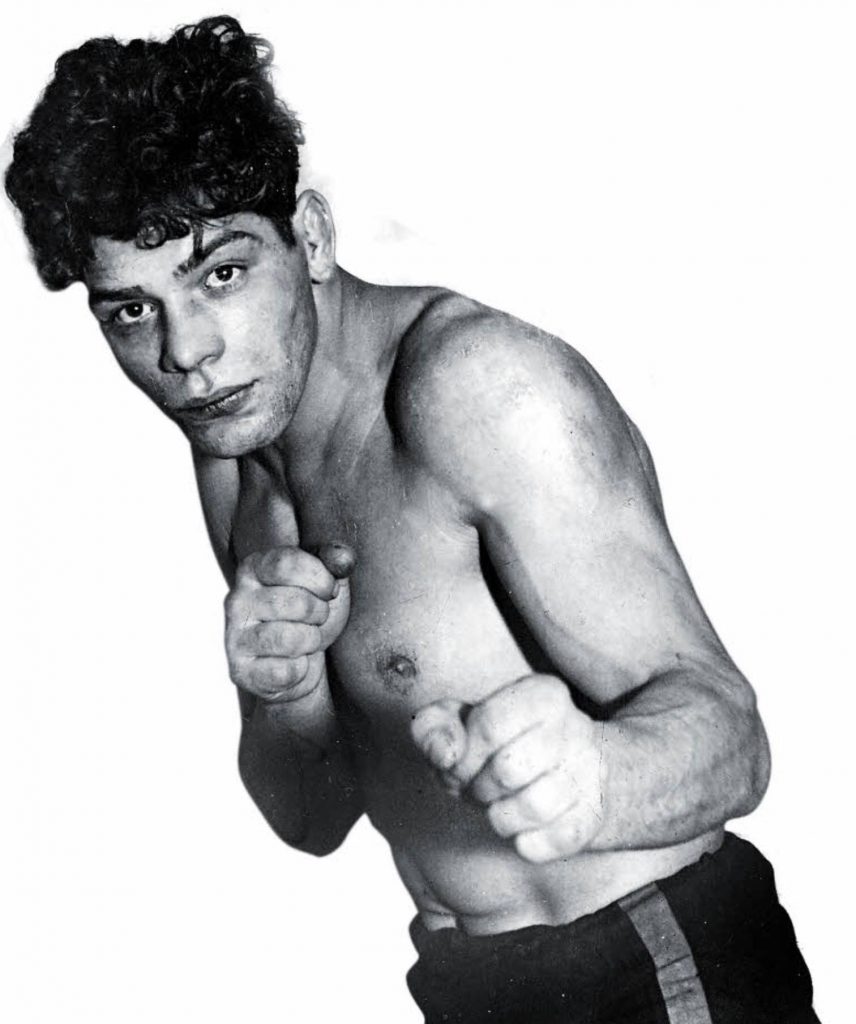
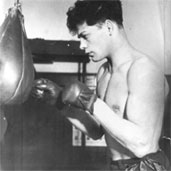
The star that was not allowed to be one
Since he was excluded from the Olympic Games nominations in 1929, he decided to become a professional boxer. Ernst Zirzow became his manager. Rukeli Trollmann became very successful in a very short time and became famous in the field of professional boxing. He won his first fight against Willy Bolze through by knock-out in the fourth round. The boxing industry had been waiting for someone like Rukeli. He was an elegant boxer, a real fighter, a good-looking man, who attracted the women. He was of the same furnace that stars are forged in.
In 1930 he successfully contested thirteen fights all over Germany. From 1932 onwards, he exclusively fought against the best boxers in welterweight, as well as in middleweight and light heavyweight. Among other boxers he boxed against Baisley, USA, (tied); against Boer, Netherlands (Rukeli won on points); Russo, Argentina (Rukeli won through knock-out in second round) and against Witt, Germany ( Rukeli won on points). When Rukeli became German Champion in 1933, the same Witt was to be his opponent.
Since 1932 the German Boxing Industry was unable to ignore Rukeli Trollmann any longer. After January 1933, when the NSDAP came into power, the life of Rukeli Trollmann changed. Boxing was renamed into German Fistfight from now on. German boxing clubs were reorganized and aryanized. The exclusion and persecution of non-aryan sportsmen and sportswomen had begun.
Erich Seelig, German Champion and dominating boxer in Rukeli’s weight division (middleweight and light heavyweight), was threatened with death before his title defence and fled to France. As a Jew his life was not safe any longer.
Rukeli Trollmann did not follow his example and remained in Germany. The National Socialist’s sports authority saw a problem with that, because Rukeli was too successful and too popular to just urge him out of the German Boxing sport like that, without any obvious reason.
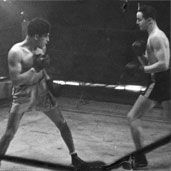
Success-destructive manipulations
On 9th of June 1933 Rukeli Trollamnn became a superstar by winning the fight against Adolf Witt on points.
Simultaneously his biggest success as a boxer became his fate. His victory was a threat for the Nazis, because Rukeli Trollmann damaged the picture of the physically superior aryan race.
Radamm, the chairman of the German Fistfight Union” was among the audience as well. As soon as it was obvious that Rukeli would win the fight, he gave order to the referees to announce the fight as tied. The referees followed his order. However, the audience was not willing to be part of this manipulation, because they have seen Rukeli win on points by far.
After massive protests and threats towards the present National Socialist functionaries, Rukeli was declared the winner. The joy about the German Champion was short-lived though. Eight days after the fight, he received a letter from the Boxing Union, which stated that they will withdraw the German Champion title. The reason given was that both boxers had shown an inadequate performance. The tile was not awarded.
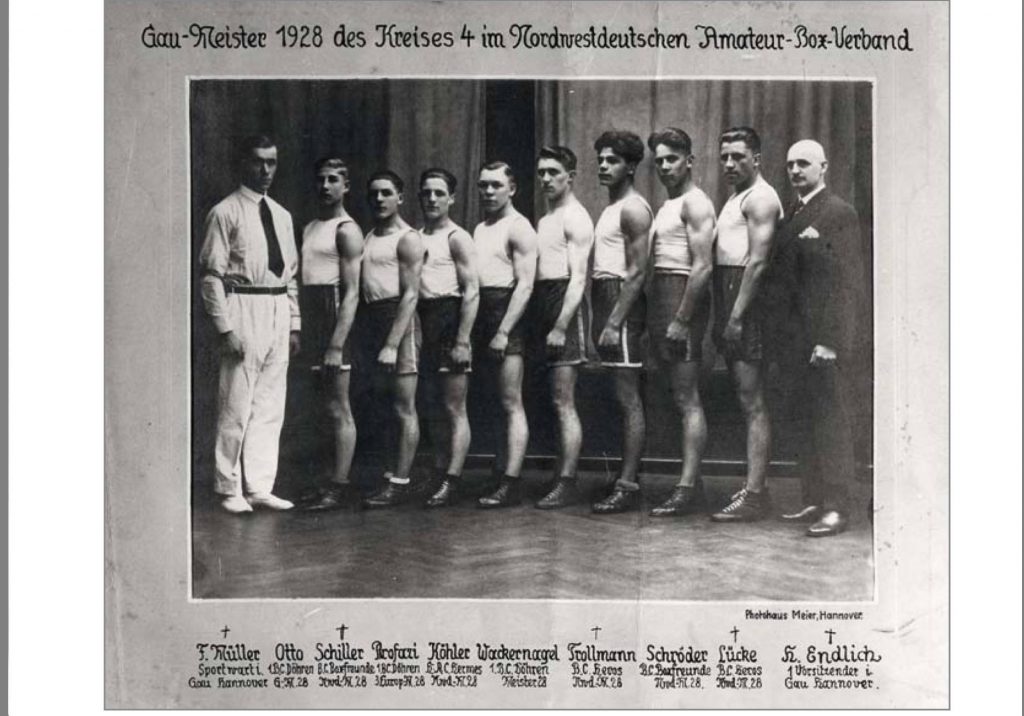
A fight against the regime
Rukeli Trollmann was still the crowd favourite, even without the title. The Nazis wanted to get rid of him. They wanted to end his career for all times and stop him from ever boxing in a German ring again. On the 21st July 1933 he was facing his next fight, which was set to be against Gustav Eder, a famous and hard-hitting boxer. Being aware of the pointlessness of his situation, he entered the ring with blond-coloured hair and a white-powdered face. It was brought to him that he would lose his boxing license, if he would not give up on his boxing style and if he would dance around in the ring like a Gipsy. He abstained from his footwork and faced the fight without balancing out the punches. He was standing in the middle of the ring, foot to foot with his opponent to take and deal out punches. He was knocked-out in the fifth round and the end of his career was finally sealed.
During the following years he battled his way through life by boxing on fairs and alternately lived in Hannover and Berlin. In Berlin he met Olga Frieda Bilda, who he married in June 1935. Together with their daughter, who was born in the same year, they lived in Berlin. The persecution of Sinti and Roma increased massively after the decree of the Nuremberg Laws on 15th September 1935. In September 1938 Rukeli Trollmann and Olga Bilda got divorced. In the same year his was deported to a Labour Camp in Ahlem, Hannover whre he remained for a couple of months.
BTo the bitter end
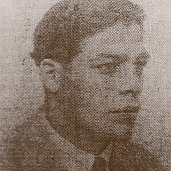
After his release he was hiding and spent some time in the Teutoburg Forest to avoid his arrest. In 1939, during the war, he was called up into the Wehrmacht, the armed forces. He was based in Poland, Belgium and France. In spring 1941 he was removed to the Eastern Front, where he was wounded. In 1942 a decree of the Wehrmacht stated that Sinti and Roma have to be excluded from the armed forces due to racist policies. In June 1942, Rukeli Trollmann was arrested and brought to the Gipsy Centre, which was located in the Hardenberg-Str. in Hannover. There he was brutally abused. In October 1942 he was brought to the Concentration Camp in Neuengamme, near Hamburg. He received the prisoner number 9841 and had to carry out hard enforced labour. Albert Lütkemeyer, a former boxing referee and now SS- Man arranged for Rukeli to fight against SS-Men every night, even though Rukeli was tired from working all day and has lost a lot of weight and no strength left from all the work and malnutrition.
With help of the illegal prisoners committee, he was able to take over the identity of a deceased prisoner. His transport to Wittenberg, a satellite camp, was organized to keep him from getting caught. But even there he was recognized and had to fight against the hated-by-many Kapo Emil Cornelius. Rukeli won the fight but during a work detail outside of the camp, he was beaten to death from behind by the Kapo.
Rukeli Trollmann’s death was figured as an accident. His corpse was buried together with other corpses of the camp in the graveyard of Wittenberg. Only when Robert Landsberger a prisoner and witness of Rukeli’s death, survived the Concentration Camp and was freed, the truth about his death was revealed.
In 2003 the German Union of Professional Boxers retrospectively awarded the German Champion title to Rukeli Trollmann. It must be mentioned though, that this happened after massive public pressure. Nina Gladitz and Yanko Weiss-Reinhardt are to name here as people who were involved very emotionally in the rehabilitation of Rukeli Trollmann.
Also to mention here are Eva Rolle and Mike Cloth. In August 2004 a street in Hannover was renamed Johann-Trollmann-Weg. Even though book-, movie- and theatre projects made his tragic destiny a little bit more known in recent years, he has not received the appreciation and public recognition yet, which he deserves as a significant sportsman and as a tragic character of recent history.
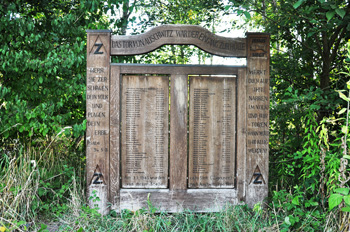
Foto: NS-Zeit-Hannover.de
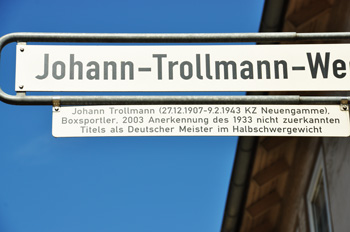
Foto: NS-Zeit-Hannover.de




